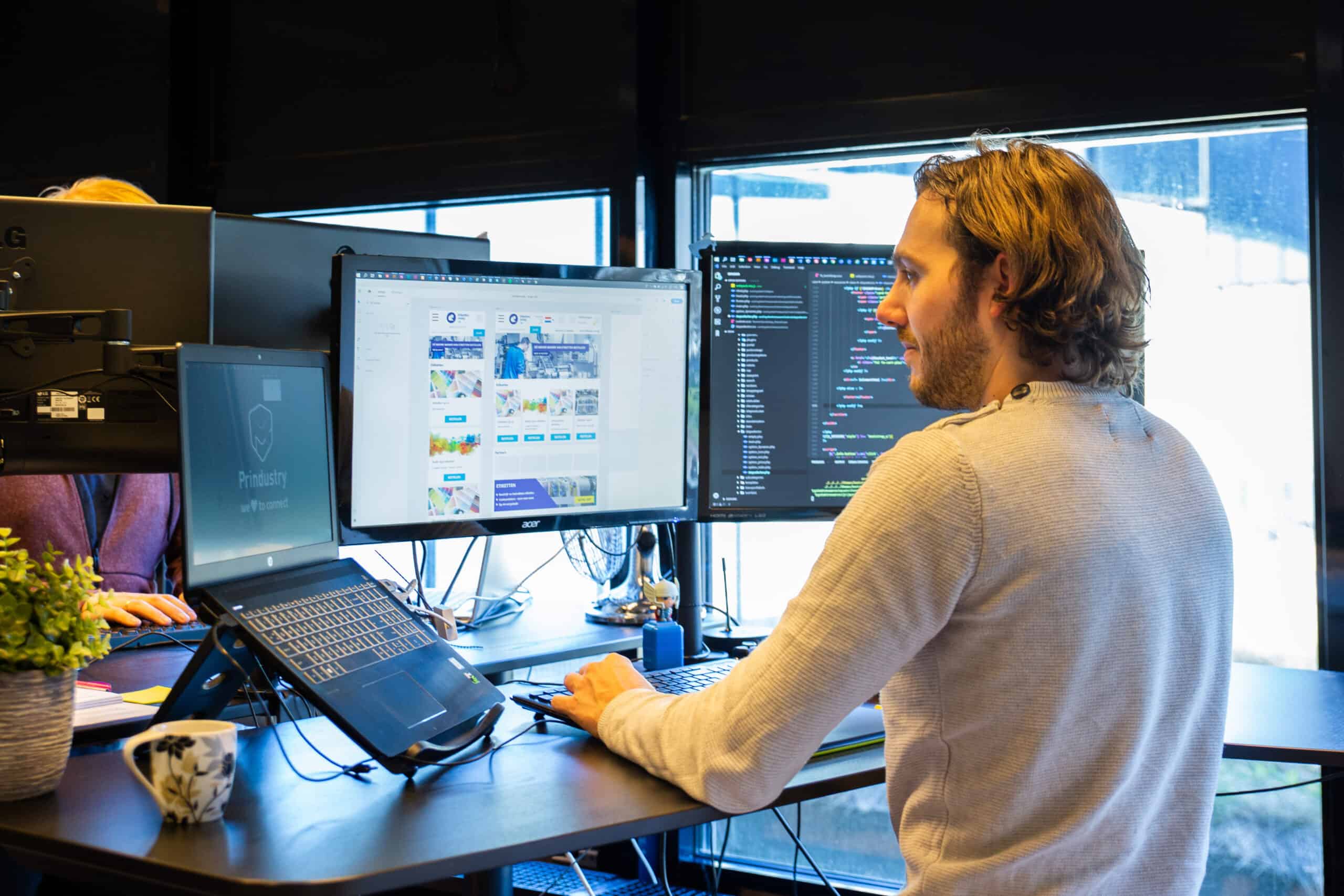With a sharp focus on personal service and speed, Donkel & Donkel has been making a difference for SMBs in the Northern Netherlands for years. “That means that we do more than supply printing. Customers come to us for a complete package of advice, design, ordering and pickup,” owner Evert-Jan Donkel reveals. “For smaller print orders, we started a webshop. That saves us a lot of time in order administration.” To make ordering easy, the graphic trade terms online have been translated into easy-to-understand language. For example, we simply call 250-gram paper ‘nice firm, normal paper.’”
Client
Donkel & Donkel
Since
2018
Software
WhiteLabelShop
High days of copy shops
Donkel & Donkel was founded more than 30 years ago at a time when copy shops were celebrating their heyday. It started with Evert-Jan’s father. “He was a sales representative at Nashuatec, which continued under the name Ricoh. When copy shops emerged, he was asked to pick up stores in the north. That started in Groningen, next to the University. Instead of a name with “copy” in it, we chose “Donkel & Donkel. This also immediately indicated that we were moving up a segment; a souped-up print shop, as it were.”
Customer relationship at the centre
Growing into a well-known name in the north of The Netherlands, Donkel & Donkel moved its location from Groningen to Drachten. “We no longer needed to be right next to the university. In fact, universities and colleges often started in-house copy shops themselves,” explains Evert-Jan. “However, we retained a loyal customer base that we now serve from Drachten. I myself still live in Groningen and start almost every day with a visit to customers there. The student target group remains an important part of this; we still cater a lot to student associations.”
That focus on the customer is what Evert-Jan is strong at and to which they undoubtedly owe the regular customer base. “I do not acquire externally, only from my appointments.”
Local distinctiveness
Besides student associations, Donkel & Donkel is there for all kinds of SMEs. “All in the northern part of the Netherlands. They are local businesses, varying in size. For example, we have also been taking care of the printing for the hospital in Drachten for years. Our local presence appears to be the distinguishing feature. Certainly people in the north seem to find this important. They like it when a company near them does the job. Often, they also want to pick up the orders. We therefore have a pickup counter to keep up the speed.”
DTP knowledge required
The product range has expanded considerably over the years. The company offers various printing services, including promotional and business printing such as flyers, cards, posters, brochures, business cards, and stationery. “In addition, there has been considerable growth in signing. This is where our added value comes into play. For most people it is difficult to deliver a good PDF, especially for products like stickers or beach flags. For the right contour lines or bleed, you need DTP knowledge. In addition to me, three DTP colleagues therefore work at Donkel & Donkel.”
The production of the assignments is done in-house when it comes to digital printing; for the other assignments, Donkel has an extensive partner network.

No technical terms in webshop
For the smaller and more standard printing requests, a webshop has emerged. “It is a good starting point for bringing in new customers, but the goal is mainly to run the smaller (repeat) orders from customers through the online order portal. It is precisely on the smaller orders that we spend a lot of time on average with order management and administration.”
Evert-Jan also appears not to lose sight of personal attention when it comes to the webshop. “I take every customer through the webshop on their first, second or even third order, so that they get sufficient explanation when ordering in a print webshop.”
The language used in the webshop has also been carefully considered: “The end customer finds graphic terms very complicated. That’s why I spent a lot of time translating graphic terminology into plain language. The average customer has no idea what to think of 250 gsm paper. That is why 250 gsm paper in the web shop is called, for example, ‘nice, firm, normal paper’. 80 gsm is ‘normal/copy paper’ and 120 gsm is ‘slightly thicker, matte paper’.”
Attention for online ordering
The online store recently received a thorough restyling. “This way we increase the user-friendliness for the customer with improvements in layout and content.” The products in the webshop are carefully composed product combinations. “It is nice to be able to work with software supplier Prindustry on this. Their platform runs stably and the support team always responds quickly. Sales invoices and quotations can be easily created. In addition, a connection has been made to our accounting environment so that invoices can be forwarded immediately.”
Innovating and staying relevant
For the future, the needs of the customer will continue to be the driving force. “You always have to keep shifting gears and see how the market responds. There are also developments that you have to monitor closely. For example, how does the customer react to rising paper prices or higher VAT on books and periodicals? We provide many periodicals for associations and foundations and the question is how they will deal with this. Will they soon opt for digital alternatives instead of print? As a result, we are also looking for additional services beyond print. This keeps it challenging – and fun – to come up with new ideas and stay relevant for our customers!”
Want to know more about our software?
We would be happy to tell you more about Prindustry’s software.
Our software experts will easily schedule an (online) appointment with you.










